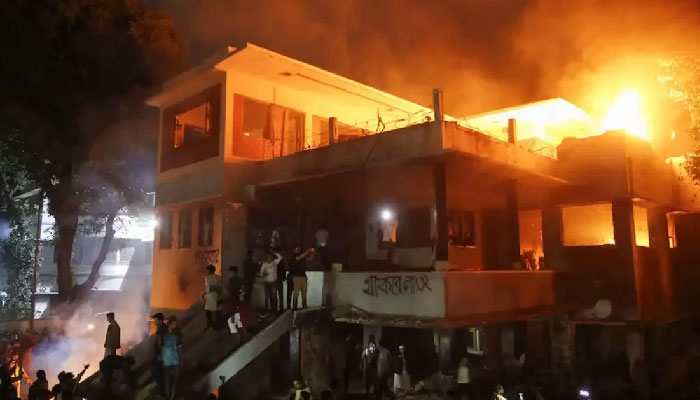Protesters Burn Bangladesh Founder’s Residence, Targeting Hasina’s Legacy
Dhaka – In a dramatic escalation of unrest in Bangladesh, protesters have set fire to and vandalized the former family residence of Sheikh Mujeebur Rahman, the founder of Bangladesh, in a move that highlights growing dissatisfaction with the current leadership of Prime Minister Sheikh Hasina.
The house, which holds historical significance as the residence of Bangladesh’s founding father, was targeted by a mob that used bulldozers to demolish the structure. The building had been converted into a museum to honor Sheikh Mujeeb’s legacy after Bangladesh’s independence from Pakistan in 1971.
The violence erupted in response to Hasina’s recent announcement that she would address the nation via social media from India, where she has been in exile since being ousted by student-led protests last year. Hasina’s move to engage with the public remotely, amid mounting criticism, appeared to fuel the unrest.
Sheikh Mujeeb, Hasina’s late father and the first president of Bangladesh, remains a national hero, but Hasina’s critics argue that her leadership has overshadowed his legacy. The protesters’ anger was particularly focused on Hasina’s autocratic rule, allegations of election rigging, and crackdowns on dissent, which have increasingly drawn backlash.
In a Facebook livestream condemning the attack, Hasina stated, “They can demolish a building, but they can’t erase history,” highlighting the symbolic significance of the attack on her father’s residence.
Read more: Pakistan & Bangladesh set to start direct flights soon
As tensions rise, around 700 protesters gathered at the site, with many also targeting properties linked to senior members of Hasina’s Awami League party. The violence is further compounded by ongoing economic challenges and political instability.
The caretaker government, led by Nobel laureate Muhammad Yunus, is struggling to manage the growing unrest while preparing for elections scheduled for late 2025 or early 2026. The situation remains volatile, with public anger against Hasina’s rule continuing to escalate.





Comments are closed, but trackbacks and pingbacks are open.